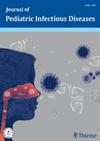儿童人乳头瘤病毒疫苗接种家长健康素养调查
IF 0.3
4区 医学
Q4 INFECTIOUS DISEASES
引用次数: 0
摘要
摘要目的了解卫生保健工作者和非卫生保健工作者父母对儿童人乳头瘤病毒(HPV)疫苗接种的知识水平和态度,揭示卫生保健工作者父母与非卫生保健工作者父母之间的差异。HPV疫苗可以潜在地预防最初的HPV感染和HPV相关的生殖器和肛门癌前病变和癌症。方法对564名同意参与研究的家长进行儿童HPV疫苗接种问题调查和态度调查。结果在我们的研究中,卫生保健工作者父母考虑给孩子接种HPV疫苗的比例(63.1%)高于非卫生保健工作者父母(11.4%)。只有5%的父母以前给他们的孩子接种过HPV疫苗;然而,从事卫生保健工作的父母和非从事卫生保健工作的父母之间没有差异。此外,与其他付费疫苗相比,这一比例相对较低(分别为49.8%、35.3%和18.8%)。以前没有给孩子接种HPV疫苗的父母正在考虑给他们的孩子接种疫苗,特别是在儿科医生建议的情况下。结论家长健康素养水平高可能不利于决定是否给孩子接种HPV疫苗。因此,应尽早为所有适龄儿童提供有关HPV疫苗接种的充分信息和认识。卫生当局应让儿科医生在提高家长对儿童HPV疫苗接种的认识方面发挥重要作用。本文章由计算机程序翻译,如有差异,请以英文原文为准。
A Survey on Parents' Health Literacy on Childhood Human Papilloma Virus Vaccination
Abstract Objective The aim of this study is to determine parents' knowledge levels and attitudes about childhood human papillomavirus (HPV) vaccination and reveal the differences between parents who are health care workers and nonhealth care workers. The HPV vaccine can potentially prevent initial HPV infection and HPV-related genital and anal precancerous disorders and cancers. Methods Questions and attitudes toward childhood HPV vaccination were asked to 564 parents who agreed to participate in the study. Results In our study, the rate of health care worker parents considering having their children vaccinated against HPV (63.1%) was higher than that of nonhealth care worker parents (11.4%). Only 5% of parents had their children previously vaccinated against HPV; however, there was no difference between parents who were health care workers and those who were not. In addition, this rate was relatively low compared to other paid vaccines (49.8, 35.3, and 18.8%, respectively). Parents who had not previously vaccinated their children against HPV were considering getting their children vaccinated, especially if a pediatrician recommended it. Conclusion The parents' high level of health literacy may not be effective in deciding to vaccinate their children against HPV. Therefore, adequate information and awareness should be provided to all parents about HPV vaccination as early as possible for all children of appropriate age. Pediatricians should be given important roles in raising the awareness of parents about childhood HPV vaccination by health authorities.
求助全文
通过发布文献求助,成功后即可免费获取论文全文。
去求助
来源期刊

Journal of Pediatric infectious diseases
Medicine-Pediatrics, Perinatology and Child Health
CiteScore
0.60
自引率
0.00%
发文量
50
期刊介绍:
The Journal of Pediatric Infectious Diseases is a peer-reviewed medical journal publishing articles in the field of child infectious diseases. The journal provides an in-depth update on new subjects and current comprehensive coverage of the latest techniques used in diagnosis and treatment of childhood infectious diseases.
The following articles will be considered for publication: editorials, original and review articles, rapid communications, letters to the editor and book reviews. The aim of the journal is to share and disseminate knowledge between all disciplines in the field of pediatric infectious diseases.
 求助内容:
求助内容: 应助结果提醒方式:
应助结果提醒方式:


